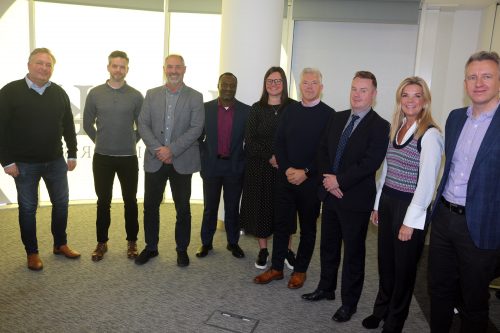Strategies to help grow your business

West Yorkshire is a £60bn economy, with 95,000 businesses and more than 1.2m people in the labour market.
“It all sounds impressive,” said Felix Kumi-Ampofo, director of inclusive economy, skills and culture at West Yorkshire Combined Authority (WYCA), “but we are 50,000 jobs short for a population of our size, 17,000 businesses short for an area that has the population we’ve got. We don’t have many primes in West Yorkshire.
“But we have some really, really impressive businesses. And our job is to find out what we can do to get more businesses to climb up to where their ambitions are and where we’d like them to be.”
Kumi-Ampofo was speaking at TheBusinessDesk.com’s Fast Growth round table, sponsored by Fresh Thinking Group and Black’s solicitors, where we invited some of Yorkshire’s fastest growing firms to discuss their growth challenges and solutions.
Not all businesses prioritised growth, he said, “But for those that have the ambition to go beyond that, we need to be there for them,” he said. “We need to work with them, run with then, make the connections so they can become the unicorns here on this patch instead of thinking they have to go somewhere else.”
Kumi-Ampofo said he was keen to ensure WYCA did not duplicate the work of private business and start-up organisations but acted as an enabler, and he urged businesses to talk to WYCA what they needed to help them grow.
The people factor
Simon Causier, commercial director of Warwick Ward, said the firm had experienced consistent growth by entering new markets and expanding their geographic reach, particularly in the south.
“We are essentially a sales and service business, so for us it was all about the people. Like any business you need good, reliable people to succeed. They key for us is loyalty. We’ve got people who have been with us for 5, 10, 15, 20, even 25 years. Obviously, we’re adding people all the time, but we’re trying to replicate that ethos.”
One of Warwick Ward’s strategies was to train new staff through apprenticeships. They also focused on good communication with monthly staff meetings rotating around their four depots to keep staff up-to-fate with the company’s figures.
Last year Warwick Ward became an employee-owned trust, with an EOT council of 12 employees and a board of four employees.
“We have a low turnover of staff. I do think you get an extra oomph for your money out of loyalty. It’s a massive factor.”
Apprenticeships proved a controversial topic. John Durkan, managing director of Switalski’s solicitors, and Gill Marchbank, chief executive of ResQ, said it was difficult to find relevant courses in their sectors.
Durkan said apprenticeship schemes should be run an expert who understood the sector.
Andy Crossley, tech director at Oakland Group, said there was a balancing act between training people and having them on the job, earning fees.
“One of our reflections over the past 12 months is that we need to get to a certain scale to be able to give us the opportunity to bring in more junior people that we can then grow and they become the seniors and leaders of the future.
“Over the last three years, when it was all hands to the pump, I couldn’t afford to bring in juniors who didn’t earn any fees for six months. But we have started to hit that point, where even our own staff are telling is to recruit more juniors.
“I need somebody to come and train us in how we can adopt those people, how we can bring them into our business, how we can make them successful and make our business successful. “
An alternative strategy
Audasi Group is the fastest growing firm in its sector, said owner and chief executive Adrian Barraclough, but he has never sought to change staff or poach a competitor’s clients.
“I found that when you try to take someone else’s client you get a lot of problems. One is that you’ve now got a customer that you’ve got to provide for better than the competitor did. You’ve given your competitor capacity to come back and find someone he wants, and you’ve made him angry. And you’ve got someone on board that is very fickle and prepared to move.”
Instead, Audasi worked on finding the right clients and helping them grow, including running workshops and training on growth.
The group took a similar approach with recruitment. Rather than hire directors with broad experience, who might regard Audasi as a stepping stone, “I invest heavily in recruiting talent at 16, 18, 20 years old, with military training or a good university, or something like that. and they’ll come in and they won’t have a job. For the next three or four months I just want them to go around the factories, go out with the drivers, work with the commercial department.
“I want them to come to me and say where they’ll be most valuable going forward. And I will try to work a career path with these people.
“I’ve got some people who want to be leaders, I’ve got some people who want to be factory workers. We all know what they want to be. And if they do want to leave the company, if it’s not right for them, I do another strange thing, I’ll work out what their best vocation is. We’ll give them some time,. Or we’ll give them a recruitment company to work with, and will pay for it. We’ll give them two months full pay to work in the offices top put a CV together, find a career path and set them off in another career. I think it’s our duty to give them that process.”
This approach, Barraclough said, ensured loyalty from customers, suppliers and staff. The three directors running the business were all under forty and all had started on the factory floor, he said.
“It makes the whole process easier, because you’ve got a more consistent team.
“It’s not hard to be a business leader. You just have to do the simple things right, and ensure repeatable quality, and learn from what’s going on. That’s all it is.”
This was the second of two reports from the Fast Growth round table. The first focussed on the challenges rapid growth brings.










